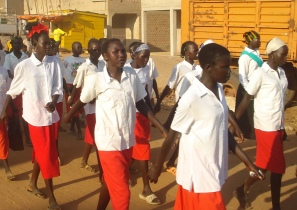South Sudan: Illiteracy denies women rights
By Philip Thon Aleu
March 9, 2009 (BOR TOWN) – Organized groups of women marched to Bor Town Freedom Square on Sunday March 8 as expected to mark the International Women Day but few could express how their rights are being violated. High rate of illiteracy in South Sudan, debits about 80% women, has always denied women opportunity to claim their rights.
 Margaret Atim Oola, an Acholi working in Bor Town whose home is in Juba, acknowledges that educated ladies are better than their illiterate counterparts but traditional norms challenge this emancipation.
Margaret Atim Oola, an Acholi working in Bor Town whose home is in Juba, acknowledges that educated ladies are better than their illiterate counterparts but traditional norms challenge this emancipation.
“Illiterate women are more harassed than those educated. But as a lady, each time I return home, I encounter some problems from in-laws who say my husband has made a mistake to allow me working in a distance place like Bor,” she said.
CONFINED TO KITCHEN
There is no clear cut between cultures in South Sudan as far women treatments. A woman is solely a man’s property primarily from marriage procedure, domestic works and tight food taboo. Men have responsibility to meet dowry prices and an over-all choice of spouse. In Dinka, Mudari, Murle, Toposa and Nuer of South Sudan, men choose ladies and meet the 30 or so cattle to bond marriages which are occasionally forceful.
In most cases – particularly in Dinka, fathers have optimum rights to choose spouses for their daughters. In Zandi, Acholi, Kaku and others however, the dowry price is lower but women’s choices are traditionally unacceptable. Women are confined to kitchen, Mrs. Atim Oola says “but you have to appreciate the harass work which is a sign of [tolerated] mistreatment” in domestic duties.
EDUCATION A BIG CHALLENGE
Girls and boys enroll equally to school at lower primary but fell below 30% before upper classes. Mary Achol attributes this decline to the fact that girls are entrusted with a lot of domestic work and the traditional believes that educated girls become prostitutes.
“This is a very big challenge which the government must address,” she stressed. According to Achol, government should enacted legislations for compulsory education for all children then leasing it to parents. Fortunately enough, South Sudan has a campaign of ‘take all children to school’ though it is ineffective due to strongly rooted cultures against women. In Jonglei State, there are only two girls’ primary schools: Aguei and Anyidi in Bor County. Numerous other girls’ school exists in South Sudan to address the situation.
Speaking at the poorly attended rally here on Sunday, SPLM women league representative calls on the government to increase the 25% representation. In the Government of Southern Sudan, influential positions taken by women include Ministry of Labour and Public Services headed by Awut Deng Acuil, Governor of Western Equartoria State Jemme Nunu Kumba, Speaker of Eastern Equartoria State Sabina Dario and SPLM Secretary for Southern Sector Anne Itto among others. However, the representation does not address violation of women rights deep in villages and specially the illiterate ones. More still, women leaders have been accused of not addressing potential harassments including force marriages, impregnations by teachers while at schools and other sexual abuses. Instead, the women leaders say “we need incentives to facilitate our work,” colleagues in villages told the Sudan Tribune on Saturday.
Representing a poem, Bor “A” girls claims ‘Days are gone when girls were denied education. Days are gone when girls were forced to early marriages’ and so days are gone.
Asked what could be the way forward, Margaret Atim says: “I hope the government hears my voice. Non-Governmental Organization and Governmental Organizations should be extended to villages to address the situation. We need change,” she said.
Presence at the rally on Sunday in Bor Town includes Jonglei Governor Kuol Manyang Juuk, Deputy Governor Hussein Mar Nyout, State ministers and NGOs representatives. For the first time in such events, Murle women group participated in the entertainment. Anyuak/Acholi, Nuer, Dinka and women associations also performed traditional dances.
(ST)

John Costa
South Sudan: Illiteracy denies women rights
All of us contributed to under education of women, all of us should work to help free women in terms of education, social and political expression. I hope positive discussion will emerge from this article, to my brothers, it is starting from your home,let us free them, and claim responsibility to develop South Sudan.
Mr Famous Big_Logic_Boy
South Sudan: Illiteracy denies women rights
There is a number of problems specifically on Nutrition-Deficiency Diseases on Bor people, just look at this photo. Skinny ladies doesn’t look like girls at this stage. This is why the entire Bor mongrels are running out of their state just because of feeding condition. Bor creatures it is not wise to sell your girls just because of food, you better dig foryourself. To me, even if you have been denied from your rights it is because of your apprearance which does not represent or fits a structure of human being.
tayeb M. Alhassan
South Sudan: Illiteracy denies women rights
I think it is best for them to stay where they are with denied rights better than to go abroad looking for that denied right.
You can log in South Sudanese Girls in U-Tube to see what is going on for them around the world.
Kwaje D
South Sudan: Illiteracy denies women rights
Infact women don’t have representatives most women occupying office where ladies friends to SPLM leaders in the army but do not reflect our bright ladies views at all.